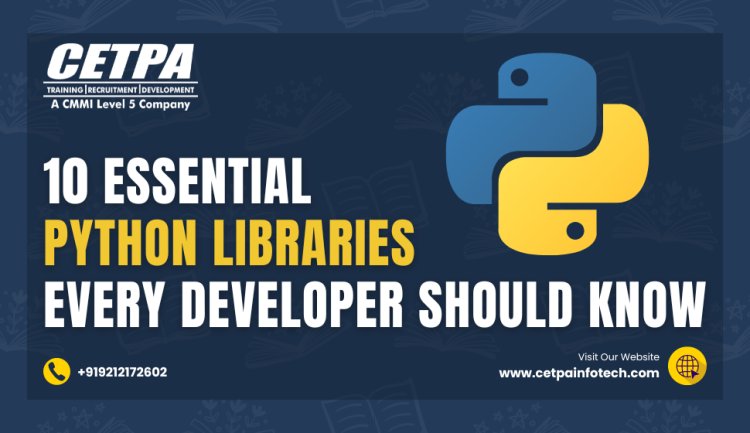10 Essential Python Libraries Every Developer Should Know
Python libraries are collections of pre-written code that provide functionalities to perform specific tasks or operations. According to Python training, here's a rundown of 10 essential Python libraries that every developer should be familiar with Like NumPy, Pandas, Matplotlib
Share this Post to earn Money ( Upto ₹100 per 1000 Views )

Python's versatility and extensive library ecosystem make it one of the most popular programming languages for a wide range of applications, from web development to data analysis and machine learning. Whether you're a seasoned Python developer or just starting out, knowing which libraries to leverage can significantly enhance your productivity and the capabilities of your projects. So, why wait? Let's take a look at all the essential Python libraries that every developer should know.
What are Python libraries?
Python libraries are collections of pre-written code that provide functionalities to perform specific tasks or operations. They enhance the capabilities of Python by offering ready-made solutions for various programming challenges, thereby saving developers time and effort. Libraries in Python are typically organized into modules, which contain functions, classes, and constants that can be imported and used in your Python code.
10 Essential python libraries that a developer should know
According to python training, here's a rundown of 10 essential Python libraries that every developer should be familiar with:
-
NumPy: The main Python library for scientific computing is called NumPy. Large, multi-dimensional arrays and matrices are supported, and a number of mathematical operations can be performed on these arrays.NumPy is essential for tasks involving numerical data, such as data manipulation, linear algebra, statistics, and Fourier transforms.
-
Pandas: Pandas depends on NumPy to provide high-level data structures and tools for data analysis. Data alignment, filtering, grouping, reshaping, and writing from a variety of sources (CSV, Excel, and SQL databases) are just a few of the data manipulation features it provides. Pandas is a vital tool for exploratory data analysis (EDA) and working with structured data.
-
Matplotlib: Python users may create static, animated, and interactive visualizations with the Matplotlib libraries. It enables you to generate a wide variety of charts and plots, including line plots, bar charts, histograms, scatter plots, and more. Matplotlib integrates well with NumPy and Pandas, making it ideal for visualizing data analysis results.
-
Scikit-learn: Scikit-learn is a simple and efficient library for machine learning tasks such as classification, regression, clustering, and dimensionality reduction. It provides a consistent interface for various algorithms and tools for model selection, evaluation, and preprocessing of data. Scikit-learn is widely used for both academic research and industrial applications.
-
TensorFlow / PyTorch: TensorFlow and PyTorch are two robust libraries for creating and enhancing deep learning models. TensorFlow, developed by Google, offers a comprehensive ecosystem with tools for neural networks, while PyTorch, developed by Facebook, emphasizes flexibility and ease of use. Both libraries support GPU acceleration and are widely adopted in the deep learning community.
-
Requests: Requests is a simple yet powerful library for making HTTP requests in Python. It provides an elegant API for interacting with RESTful APIs and fetching data from web servers. Requests handle authentication, cookies, headers, and other HTTP-related tasks efficiently, making it a go-to choice for web scraping, API integration, and web development.
-
Beautiful Soup: Beautiful Soup is a library used for extracting data from HTML and XML files. It provides tools for parsing HTML documents, navigating the parsed trees, and extracting data based on tags, attributes, and classes. Beautiful Soup is invaluable for tasks involving web scraping, data extraction, and content aggregation from websites.
-
Django / Flask: Popular web frameworks for Python web application and API development are Django and Flask. Django is a battery-free full-stack framework with integrated features including an object repository, user authentication, and an admin interface. Flask, on the other hand, is lightweight and flexible, allowing developers to choose components as needed. Both frameworks are widely used and have large communities.
-
SQLAlchemy: SQLAlchemy is an SQL toolkit and Object-Relational Mapping (ORM) library for Python. It provides a flexible and high-level interface for interacting with relational databases, abstracting away the differences between database engines. SQLAlchemy supports a wide range of database systems and simplifies tasks like database schema management, querying, and transactions.
-
Pytest: Pytest is a framework for creating and running Python tests. It offers simple syntax and powerful features for writing unit tests, functional tests, and integration tests. Pytest supports fixtures, parameterized testing, and plugins for extending functionality. It’s known for its readability, scalability, and compatibility with other testing tools and frameworks.
Conclusion:
Mastering these essential Python libraries equips developers with the tools needed to tackle a wide array of tasks—from numerical computing and data analysis to machine learning, web development, and testing. Whether you're working on scientific computing projects, building web applications, or diving into deep learning, these libraries provide robust foundations and accelerate development processes. As you explore and utilize these libraries in your projects, you'll discover their versatility and the immense possibilities they offer for creating powerful Python applications.
So, why wait? Enroll in Python Training in Delhi or elsewhere now! And learn all the libraries that a developer must know. Happy coding!







